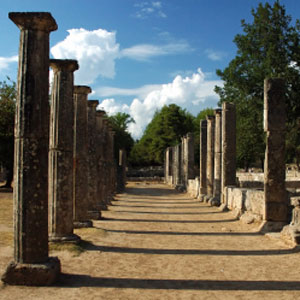The Mediterranean Sea sits in the middle of a continental and cultural crossroads. With Europe to the north, Asia to the East and the northern coast of Africa to the south, the Mediterranean has witnessed the rise and fall of numerous cultures and civilizations throughout history.
The coastal resorts of Italy, Spain, France, Greece and Northern Africa maintain a high level of appeal to travelers, but the ability to see a lot in a short amount of time is limited when traveling by land. Cruising the Mediterranean has been steadily increasing in popularity, offering vacationers the options of visiting several ports of call during the course of a week or two plus the experience of sailing one of the most navigated bodies of water in history.
Cruising the cradle of modern civilization
From relics of ancient antiquity to architectural wonders of the Middle Ages, and the sophistication of Renaissance treasures, the many countries of the Mediterranean offer eager history buffs a veritable trip through time. It is not surprising that the entire region has been dubbed the ‘birth-place of civilization’. Here, some of the first civilizations rose and left their mark upon history, culture, art and architecture, among them the Minoans, the Mycenaeans, the Phoenicians, the Canaanites, the Hittites and, of course, the Egyptians. Later, the technology and philosophy of the ancient Greek kingdoms and city-states, including Macedonia, Athens and Sparta, spread with the armies of Alexander the Great throughout the Middle East, Egypt and Greece. Though Alexander’s empire was short-lived, its influence is still felt and seen today throughout the Mediterranean.
The Mediterranean was known as Mare Nostrum, “Our Sea” by the citizens of a city on the shores of the Tiber River in Italy. Rome rose from those swampy lands to dominate the Mediterranean and, eventually, the then-known world. Rome endured until the end of the fifth century but the innovation, architecture and political philosophies that sprang from this dynamic civilization continue to inspire and caution the modern world.
The early portions of the Middle Ages saw the rise of Islam in the east and the Arab Empire became the dominant force in the region, controlling three-quarters of the Mediterranean at its peak. Most of North Africa retains the influence of the Arabians to this day, while Spain’s culture, architecture and cuisine bear the marks of their Arab rulers. Sicily, once a major emirate in the Mediterranean, developed its own unique culture fusing Arab, Western and Byzantine influences.
The late Middle Ages and Renaissance periods saw the rise of the Maritime Republics in Italy (Amalfi, Genoa, Pisa and Venice) where Italian traders ruled; in the west, Spain’s Crown of Aragon ruled vast territory south to North Africa and east to Sicily and Naples. Portugal initiated the Age of Discovery, venturing into the Atlantic and around Africa to bring spices and dyes from the east.
Best time to cruise
Mediterranean cruises may be enjoyed for most of the year; from September through May, the temperatures are comfortable and there are few crowds. Late October through mid-April is best for visiting the southern reaches of the Mediterranean from Egypt in the east to Morocco, and the Canary Islands in the west.
